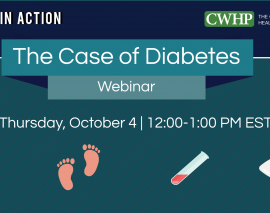Resources
Resources
Here you'll find new evidence and guidance from various sources across a variety of conditions of relevance to different audiences.
Resource
Thursday, October 4th, 2018: V-BID in Diabetes Webinar

Resource
Population Health to Personalized Medicine: Connecting Disease Indicators to Work Outcomes - Diabetes

Resource
Pilot Project: Predicting Who Will Respond Best to Medical Treatments
Resource
Does Daily Self-Monitoring of Blood Sugar Levels Improve Blood Sugar Control and Quality of Life for Patients with Type 2 Diabetes Who Do Not Use Insulin?
Resource
Comparing Three Methods to Help Patients Manage Type 2 Diabetes
Resource
Diabetes Archives | Integrated Benefits Institute
